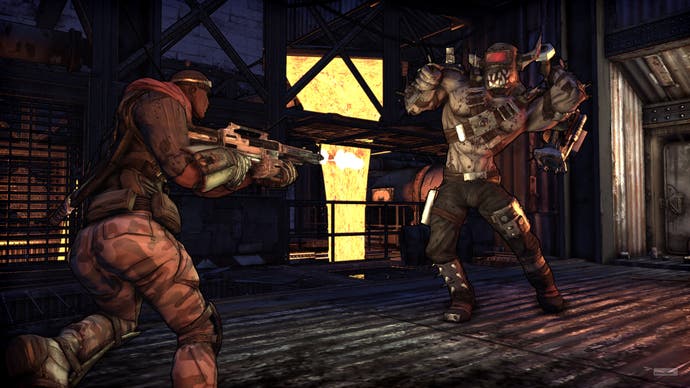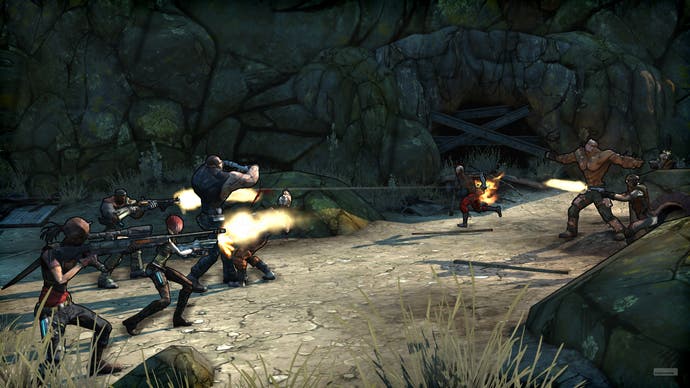Borderlands
Risky business.
Gearbox can make first-person shooters in its sleep, and so that side of the game feels immediately solid and satisfying (although aiming, especially when zoomed-in, feels ever-so-slightly off). The key difference is, when you shoot a living creature in the face, numbers magically appear above their heads in classic RPG fashion as health deteriorate towards "critical" and then, well, "dead".
It's certainly far less intense than Christian's E3 demo experience with a greater sense of desolation and uncertainty in the wilderness, rather than blood-curdling panic. It also reveals some of the challenges Gearbox faces in blending the two main gaming ingredients, with early missions serving both as a testing ground for basic skills and as means to coerce the player into ramping up stats from the off to kick-start the levelling-up process.
Grinding in the early stages can be as simple as wandering into the desert to find skags to slaughter, looting their remains for items. Its usefulness becomes blindingly apparent when I reach the first boss, a shady type called Nine Toes, who battles you in an arena-like setting flanked - utterly unfairly - by armoured skags. After repeated attempts I don't even come close to winning.
On the one hand, it's perfectly possible I'm simply rubbish and failing to spot the obvious required strategy. On the other hand, I'd likely have fared better with beefier stats. "Maybe we put some more training up about skills and how to optimise your gameplay through your character," Pitchford suggests.
"Because it's an RPG, you can go grind somewhere else. There are some people that have trouble with Nine Toes not because they're not good, but because they were just able to get there quickly and efficiently, and maybe they didn't take down as much other stuff and get as much experience."

This raises an important issue. While grinding is a routine pleasure for those hardened to the mechanic, as long as its served in an engaging way, what of the "typical shooter" fan who rattles on through, only to find he'd have been better off spending half an hour blasting frothing space mutts? For those who find that an unpalatable prospect, there are the side missions.
In this particular case, says Pitchford, "there's also an optional side-quest that you can do before, that if you can do that you tend to get enough experience to go up one level and that makes a huge difference."
What's abundantly clear is that for all the potential of the combat and skill systems, I'm barely scratching the surface here. So Gearbox promptly dumps me, and the other games hacks in the room, into co-op multiplayer at level 20. Given a blank skills slate and 20 levelling up points, plus a choice of character type, we can spend the points wherever we like - and here's where the game's tantalising promise finally emerges.
Special abilities can be selected and upgraded and skill trees nurtured to produce a huge range of outcomes that, from what I am able to tell, could easily make one person's experience of the game markedly different from another's.
In co-op this goes a stage further, and by working together (which, admittedly, we do with all the effectiveness of Newcastle Utd.), skills and abilities can be complemented to create a squad of fearsome destructive potential, bolstered by high medic skills that could make the difference in the many ferocious battles for survival. A lone assault on a giant spider ant, as I discover, is ill-advised.

Having romped around Borderlands in single- and multiplayer for less than an hour, it's still too early to call. The scope, potential and promise are all clear, and if the various diverse strands of action, RPG and narrative tie together in the compelling manner Gearbox is shooting for, this will not just be an experience all of its own this Christmas, but potentially a very good one.
The challenge in leaving so much to chance by weaving narrative set-pieces into what is in some ways a vast, freeform tapestry of deliberately random events, is in keeping the player engaged and motivated throughout. Some of the enforced back-and-forth gameplay I encounter in this small sample suggests this could prove an issue.
But Gearbox, aged 10, is long enough in the tooth to be well aware of all of this and more. And though it is a huge roll of the dice for both the studio and publisher 2K Games, Pitchford sees it as an important one not just for his company, but the industry as a whole.
"I think eventually [games are] going to be the dominant form of entertainment if we're not already," he states. "What's going to get us there is being able to take risks and being able to innovate. Because if we always do the same stuff we don't push ourselves forward anymore."
Commendable? Yes. High risk? Yes. Place your bets.
Borderlands is due out for PC, PS3 and Xbox 360 on 23rd October.
















